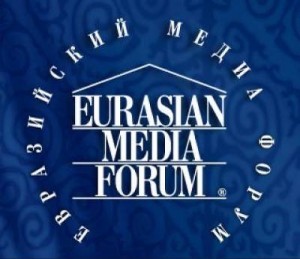 Panel Notes Chance for Settling Iranian Nuclear Programme Issue
Panel Notes Chance for Settling Iranian Nuclear Programme Issue
ASTANA– “The USA and Iran have reached a deal,” was the headline across the world’s media in November 2013 after several rounds of talks over Iran’s nuclear programme.
For the first time in more than 30 years, six world powers and Iran had found a diplomatic solution. Tehran committed to stopping producing any uranium enriched above 5 percent, suspending plutonium production and giving access to the International Atomic Energy Agency (IAEA) inspectors to the previously inaccessible nuclear facilities. This was something that western diplomats could not even dream about 10 years ago.
The second panel session at the April 24-25 Eurasian Media Forum addressed such issues related to the Iranian nuclear programme as the opportunity to remove this “nuclear game” story from the political horizon; the odds of success for this historic agreement and the possible re-imposing of sanctions on Iran by the United States.
The subject of the “nuclear game” in the political arena became a matter of dispute among the meeting’s participants.
Former House Speaker of U.S. Congress Newt Gingrich noted that if the arrangement happens and if transparency and accountability are present, there is the likelihood that Iran will not pursue its nuclear weapons development. Gingrich stressed that the word “if” was key.
In response, Adviser to the Minister of Foreign Affairs of Iran Seyed Mohammad Kazem Sadjadpour said that his country has never had and will never have a nuclear programme for military purposes, despite the fact that some states suspected Iran of developing nuclear weapons and used this as an excuse to impose sanctions. He hoped that during the course of negotiations Iran could convince other countries that it had no nuclear weapons ambitions.
Doubts about the desire of Iran to develop nuclear weapons were also expressed by former Secretary of the Ministry of Foreign Affairs of India Rajiv Sikri. General Director of the Russian Centre for Study of Modern Iranian Research in Russia Rajab Safarov encouraged the West to interact with Iran and not to get involved in sanctions against the country.
Sikri also spoke about sanctions against Iran and focused on the fact that sanctions should lead to a result. But in fact they have failed and created anti-American sentiment among the Iranian public. “I don’t think that sanctions have to be entered beyond the scope of the United Nations. It is necessary to build reasonable, adult dialogue,” he said.
In turn, the president of the National Iranian-American Council Trita Parsi said that sanctions represent a more humane way of dealing with the issue than war.
“If we talk about the Iranian crisis, I consider that it is artificially created. This process takes strength from all parties. Iran is not a new nation, for centuries it has been participating in international politics. Independence is very important for Iran,” Sadjadpour said.
Middle East ‘Tinder Box’ Debated
The situation in the Middle East, with the emphasis on the crisis in Syria and the historic accord signed recently between Palestinian factions Fatah and Hamas was the subject of discussion at the 12t annual Eurasian Media Forum.
Former Israeli Prime Minister Ehud Barak was a key panelist and, as head of the Azmaut Political Party, spoke about the challenges facing Israel and the region and warned the situation in Syria is far from a resolution.
The session was hosted by Russia Today presenter Oksana Boyko and put the focus on the crucial issues facing the region and how they influence world affairs.
“The Middle East is a big chess board, which is played with the great powers of our age,” Russian First Channel narrator and political analyst Maxim Shevchenko said.
“It plays with the destinies of nations, the destinies of different ethnic religious groups. The Middle East is a demonstration of meanness and [the crimes of the modern world order],” he said.
“All that we see in this region is a continuation of colonialism, its most hideous modern forms when there are no Redcoat British Army infantry and the money given to Tel Aviv, Damascus or Cairo. The Middle East states are a in continuous state of war,” he continued.
“I am sure that Jews and Palestinians will find a common language,” Shevchenko added.
Other speakers at the session included Claude Salhani, senior editor, Trend News Agency, Harvey Morris, political analyst and a journalist from the U.K., Savac Genc, columnist at Today’s Zaman, Turkey and Basel Haj Jasem, an expert journalist at Al Arabiya news channel in Syria.
Pundits Examine Eurasian Integration
The potential economic integration long-discussed by some of the Commonwealth of Independent States was examined by a panel of experts at the Eurasian Media Forum in Astana.
Growing unemployment, currency issues and low industrial performance and productivity were all raised as concerns by panelists and delegates, who pointed to flaws in the European Union governance and threats by countries such as the United Kingdom to either withdraw or scale back their involvement.
Panelists pointed to the “lesser among equals” issues faced by the smaller and weaker countries in the EU such as Romania, Slovenia, Bulgaria and Greece.
“We have just built a somewhat stable economy in Armenia,” said Sergey Shakaryants, a policy analyst from Armenia.
But, according to Shakaryants, Armenia simply put its domestic house in order and recovered from the Soviet past but would now have to restructure the entire economic system once more to prepare for Eurasian integration.
“There is an oriental saying: Let the fruit become ripe first and then pick it,” he said.
The session on Eurasian Integration was moderated by Russian TV presenter at RBC TV Daniil Babich and included Vladimir Lepehin, director general of EurAsEC institute, Russia, Tofiq Abbasov, political analyst, chief editor of The New Baku Post, Faruk Caliskan, deputy director of foreign news at Anadolu, Turkey and Shahida Tulaganova, director of School of Investigative journalism, U.K.

